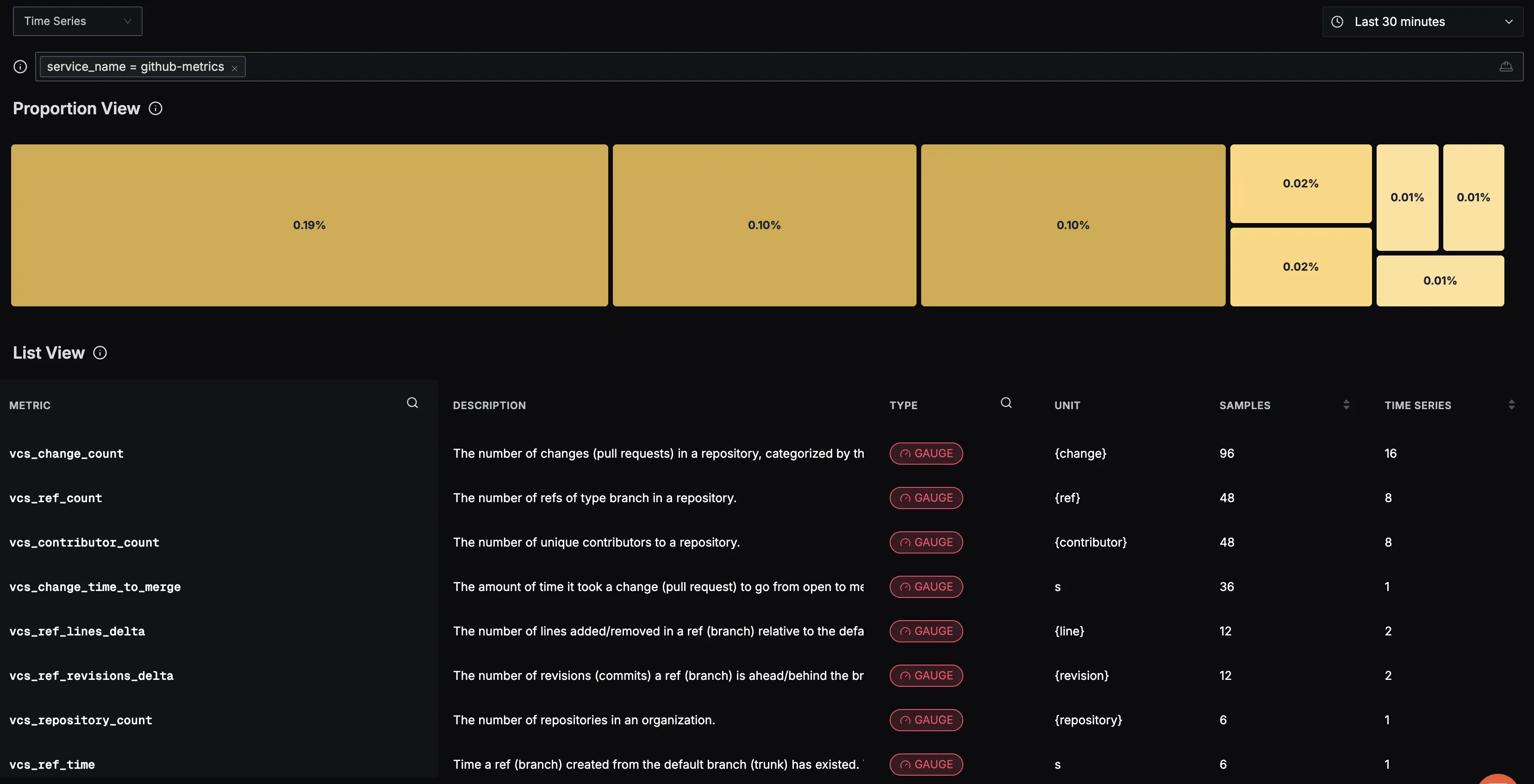This document contains instructions on how to monitor the GitHub Repos using GitHub Receiver to scrape metrics using GitHub GraphQL and REST APIs.
Prerequisites
Access token is required for scraping the metrics which can be generated in 2 ways.
Setup
Step 1. Setup OTel Collector
The OpenTelemetry (OTel) Collector helps collect telemetry data such as logs, traces and metrics from your application. Please follow the documentation here to setup the OpenTelmetry Collector in your VM. Make sure to use the latest OTel Collector release.
Step 2. Setup GitHub Receiver
Update the config.yaml file that you created in otelcol-contrib folder while setting up OTel Collector to include the github receiver under the receivers section.
receivers:
github:
log_level: debug
initial_delay: 1s
collection_interval: 60s
timeout: 30s
scrapers:
scraper:
github_org: <github-org>
metrics:
vcs.contributor.count:
enabled: true
auth:
authenticator: bearertokenauth/github
processors:
resource/github:
attributes:
- key: service.name
value: <service-name>
action: insert
extensions:
bearertokenauth/github:
token: ${GH_PAT}
<github-org>: Your GitHub Org.<service-name>: Specifies the service that emits the metrics, making it easier to identify and filter metrics related to a specific GitHub integration.GH_PAT: This environment variable, which you will create in Step 4, contains your GitHub access token.
Step 3. Add GitHub Receiver to pipelines
In the config.yaml file, under the service section, locate the pipelines block. Within the metrics pipeline, add github to the list of receivers.
...
service:
extensions: [bearertokenauth/github]
pipelines:
metrics:
receivers: [github]
processors: [resource/github]
exporters: [otlp,debug]
...
Step 4. Run the OTel Collector
Set an environment variable named GH_PAT. Inside otelcol-contrib folder, run the otelcol-contrib command.
export GH_PAT=<access-token>
./otelcol-contrib --config ./config.yaml
<access-token>: Your GitHub access token.
Step 1. Create github-otel-collector.yaml file
💡 At the time of writing this guide, the SigNoz OTel Collector does not support the GitHub Receiver.
Create K8s resources like namespace, configmap, deployment and service as below to modularize and manage the GitHub OTel Collector setup. The Namespace isolates the resources, the ConfigMap provides the collector configuration, the Deployment runs the collector as a pod, and the Service allows internal access (if needed) to the collector, enabling it to scrape GitHub metrics and export them to SigNoz Cloud.
...
apiVersion: v1
kind: Namespace
metadata:
name: signoz
---
apiVersion: v1
kind: ConfigMap
metadata:
name: github-metrics-collector-config
namespace: signoz
data:
config.yaml: |
receivers:
github:
log_level: debug
initial_delay: 1s
collection_interval: 60s
timeout: 30s
scrapers:
scraper:
github_org: <github-org>
metrics:
vcs.contributor.count:
enabled: true
auth:
authenticator: bearertokenauth/github
processors:
resource/github:
attributes:
- key: service.name
value: <service-name>
action: insert
extensions:
bearertokenauth/github:
token: ${GH_PAT}
exporters:
otlp:
endpoint: ingest.<region>.signoz.cloud:443
headers:
signoz-ingestion-key: ${SIGNOZ_INGESTION_KEY}
tls:
insecure: false
debug:
verbosity: detailed
service:
extensions: [bearertokenauth/github]
pipelines:
metrics:
receivers: [github]
processors: [resource/github]
exporters: [otlp, debug]
---
apiVersion: apps/v1
kind: Deployment
metadata:
name: github-metrics-collector
namespace: signoz
spec:
replicas: 1
selector:
matchLabels:
app: github-metrics-collector
template:
metadata:
labels:
app: github-metrics-collector
spec:
containers:
- name: collector
image: otel/opentelemetry-collector-contrib:0.123.0
command:
- "/otelcol-contrib"
- "--config=/etc/otel/config.yaml"
env:
- name: GH_PAT
value: "<ACCESS_TOKEN>"
- name: SIGNOZ_INGESTION_KEY
value: "<your-ingestion-key>"
volumeMounts:
- name: config
mountPath: /etc/otel
volumes:
- name: config
configMap:
name: github-metrics-collector-config
---
apiVersion: v1
kind: Service
metadata:
name: github-metrics-collector
namespace: signoz
spec:
type: ClusterIP
ports:
- port: 4317
targetPort: 4317
selector:
app: github-metrics-collector
...
<github-org>: Your GitHub Org.<service-name>: Specifies the service that emits the metrics, making it easier to identify and filter metrics related to a specific GitHub integration.<region>: Your chosen region for SigNoz Cloud.<ACCESS_TOKEN>: Your GitHub access token.<your-ingestion-key>: Your SigNoz Cloud Ingestion Key.
Step 2. View Logs of GitHub OTel Collector
Run the following command to view the logs.
kubectl logs -f github-metrics-collector-<id> -n signoz
Step 1. Install SigNoz
Install SigNoz by following this link.
💡 At the time of writing this guide, the SigNoz OTel Collector does not support the GitHub Receiver.
Step 2. Add GitHub OTel Collector Service
Add the github-otel-collector service under services section of docker-compose.yaml file.
...
github-otel-collector:
image: otel/opentelemetry-collector-contrib:0.123.0
container_name: github-otel-collector
command: [ "--config=/etc/otel-collector-config.yaml" ]
volumes:
- ./github-otel-collector-config.yaml:/etc/otel-collector-config.yaml
environment:
- GH_PAT=<ACCESS_TOKEN>
networks:
- signoz-net
depends_on:
- otel-collector
...
<ACCESS_TOKEN>: Your GitHub access token.
Step 3. Disable Default SigNoz OTel Config Paths
Comment the following lines under command section of otel-collector service in docker-compose.yaml file.
...
otel-collector:
command:
# - --manager-config=/etc/manager-config.yaml
# - --copy-path=/var/tmp/collector-config.yaml
...
Step 4. Create GitHub OTel Collector Configuration
Create github-otel-collector-config.yaml file and add the following contents.
...
receivers:
github:
log_level: debug
initial_delay: 1s
collection_interval: 60s
timeout: 30s
scrapers:
scraper:
github_org: <github-org>
# search_query: ""
metrics:
vcs.contributor.count:
enabled: true
auth:
authenticator: bearertokenauth/github
processors:
resource/github:
attributes:
- key: service.name
value: <service-name>
action: insert
extensions:
bearertokenauth/github:
token: ${env:GH_PAT}
exporters:
otlp:
endpoint: signoz-otel-collector:4317
tls:
insecure: true
timeout: 30s
debug:
verbosity: detailed
service:
extensions: [bearertokenauth/github]
pipelines:
metrics:
receivers: [github]
processors: [resource/github]
exporters: [otlp,debug]
...
<github-org>: Your GitHub Org.<service-name>: Specifies the service that emits the metrics, making it easier to identify and filter metrics related to a specific GitHub integration.
Step 5. Update SigNoz OTel Collector Configuration
Update the existing otel-collector-config.yaml file with the following contents.
...
receivers:
otlp:
protocols:
grpc:
endpoint: 0.0.0.0:4317
http:
endpoint: 0.0.0.0:4318
exporters:
clickhousemetricswrite:
endpoint: tcp://clickhouse:9000/signoz_metrics
resource_to_telemetry_conversion:
enabled: true
service:
pipelines:
metrics:
receivers: [otlp]
processors: []
exporters: [clickhousemetricswrite]
...
Step 6. Restart OTel Collector Services
Restart the otel-collector service and github-otel-collector service.
docker compose -f docker/docker-compose.yaml restart otel-collector
docker compose -f docker/docker-compose.yaml restart github-otel-collector
Step 7. View Logs of GitHub OTel Collector
Run the following command to view the logs.
docker compose -f docker/docker-compose.yaml logs -f github-otel-collector
Validate Metrics in SigNoz
- The following default metrics are scraped and can be viewed under the
Metricstab in the SigNoz UI.

- Refer this link for more info on metrics.
